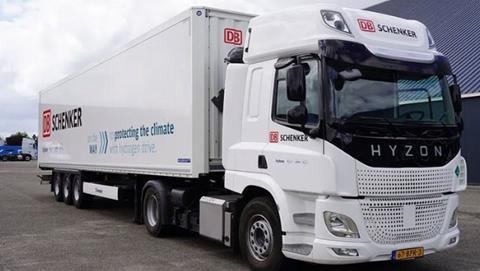Hyzon Motors and DB Schenker are leading the charge towards sustainable logistics operations with the deployment of a Fuel Cell Electric Truck in Germany. The heavy-duty vehicle, powered by Hyzon’s zero-emission fuel cell technology, is being used in daily operations between Cologne and Eupen, Belgium, making it the first of its kind to be used commercially in Germany.

Logistics service provider DB Schenker is using the truck through a pay-per-use model offered by Hylane, a rental company specialising in CO2-neutral commercial vehicles. Hylane, a wholly-owned subsidiary of Germany’s DEVK, offers comprehensive hydrogen solutions for the logistics sector, minimizing the risk for customers and accelerating the rate at which zero-emission vehicles replace diesel.
With Germany expected to become one of the major global markets for zero-emission commercial vehicle technologies in the coming years, the deployment of Hyzon’s fuel cell truck in the country represents a significant milestone. The government has already put domestic incentives in place to transition heavy vehicles off diesel, making the adoption of sustainable logistics operations an important objective.
Hyzon’s fuel cell technology, developed over two decades, is purpose-built for heavy-duty applications, making it an ideal choice for logistics companies such as DB Schenker. The deployment of the company’s fuel cell trucks in challenging environments around the world is providing valuable operational experience, which is helping to advance the technology and contribute to global decarbonization efforts.
According to Parker Meeks, President and interim CEO of Hyzon Motors, the partnership with DB Schenker and Hylane is an important step towards the company’s goal of providing sustainable transportation solutions. “Our trucks are being deployed in challenging environments around the world, and we are gaining real-life, operational experience with forward-thinking partners such as Hylane and DB Schenker – helping us progress our vehicle performance and thus global decarbonisation,” he said.













